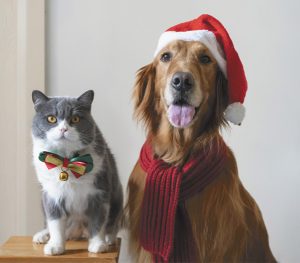 A few classic pet scenes from Christmas Vacation keep us laughing every year— The slobbering, menacing dog is nosing through the trash, hacking on bones under the table, the tree has a rogue squirrel in it that wreaks havoc on the entire house within seconds, and Aunt Bethany accidentally wrapped up her cat as a Christmas gift. Always a great hit for a good time, but in real life, these scenarios are extremely dangerous. Hopefully, no one you know accidentally wraps up their cat.
A few classic pet scenes from Christmas Vacation keep us laughing every year— The slobbering, menacing dog is nosing through the trash, hacking on bones under the table, the tree has a rogue squirrel in it that wreaks havoc on the entire house within seconds, and Aunt Bethany accidentally wrapped up her cat as a Christmas gift. Always a great hit for a good time, but in real life, these scenarios are extremely dangerous. Hopefully, no one you know accidentally wraps up their cat.
When it comes to our pets, Christmas decorations can be rather captivating, and their curiosity may get the better of them. Cats and dogs may find it irresistible to play with the decorations, and dogs often try to eat them. This is a major health hazard to the safety of our beloved pets, as tinsel and ribbons can tangle around the intestines, which is a life-threatening situation, and usually requires extensive surgery to remove.
The same issue holds true for holiday glass decorations and tree ornaments. If your pet bats them around the floor or paws at them on the tree, they can shatter and cause lacerations internally and externally. Tree lights can cause the same scenario, but with the added worry of getting a jolt of electricity. And we certainly don’t want pets getting tangled up in lights or having the tree fall down on them.
It’s best to monitor your pet. Never let them play with the decorations and keep them blocked off from the area when you’re not home.
Food Concerns
Many foods, drinks, herbs, and ingredients are toxic to our pets. When we think of some of the top contenders, most people are aware of the health hazards that chocolate can induce in pets, and with Christmas just around the corner, what better time to discuss these foods and the risks they pose to our pet’s wellbeing.
Chocolate causes severe toxicity with just a minimal amount, especially dark chocolate. Some of the side effects are vomiting, diarrhea, lethargy, seizures, rapid heart rate, and in some cases, death. The smaller the breed, the more dangerous chocolate can be, as well as the amount of chocolate the animal has ingested.
Raisins, grapes, and cherries are also very toxic to animals. Grapes and raisins affect the liver and kidneys in dogs and cats. Even if eaten in small amounts, it can cause significant damage and death. Cherries are poisonous to cats and dogs and can cause respiratory failure and death. The pits and seeds in fruits (cherries, avocado, peaches, apples) contain cyanide, so these are especially toxic and can also cause choking.
Sugar is not necessarily toxic, but it is not suitable for cats or dogs to eat sugar, because as with humans, sugar can lead to diabetes, obesity, shaking, lethargy, and dental decay. Sugar alternatives like xylitol are incredibly toxic to dogs. Don’t ever let your pet eat candy, mints, toothpaste, or gum made with xylitol or other sugar substitutes.
Nuts can cause severe reactions in dogs and cats, this especially true of macadamia nuts. If your pet gets into holiday candy that is packed with chocolate and nuts, this can be a double whammy. If it also has dried cherries or raisin, it’s not a good combination. But again, if this happens, it’s important to try and figure out how much they consumed and also to take their size into consideration. If a Chihuahua eats a box of dark chocolate, then you definitely will want to seek medical attention. It’s always best to be proactive, so even if a Border Collie eats the same amount, getting them checked out will be the best option for your pet’s health.
Aside from candy, some people think it’s okay to feed animals leftovers or give them food scraps from the table but understanding the difference between safe foods and the dangerous ones is imperative to your pet’s health.
Holiday Food Hazards
Onions and garlic can cause anemia in pets. Anything in that family, such as powdered spices, chives, scallions, shallots, these are all very toxic to cats and dogs.
Bones may seem like a reasonable thing to give a dog, but they can splinter very easily, which can cause choking, blocked airways, and internal bleeding. Fat trimmings or other fatty foods can lead to liver and pancreatic disorders. Salty Ham is a big no-no for pets too, as their sodium tolerance is very limited.
Mushrooms in the yard are especially toxic to animals. Even if your curious puppy eats a small mushroom, the toxicity can cause severe gastrointestinal issues, seizures and even death.
There are so many things that can cause toxicity in your pets; it is best only to feed them their allocated dog or cat food and treats. If your pet gets into candy or other toxic foods, don’t hesitate! Get to your veterinarian’s office or the Animal ER as soon as possible.
Animal Oasis Veterinary Hospital in Naples offers the most up to date and progressive veterinary services for your pets. Ranging from laser surgery, ultrasound, dental X-rays, radiology, full pharmacy, and in house diagnostics, Animal Oasis Veterinary Hospital provides your pets with the necessary options for treatment.
Animal Oasis Veterinary Hospital in Naples
239-431-9667
www.aovethospital.com









